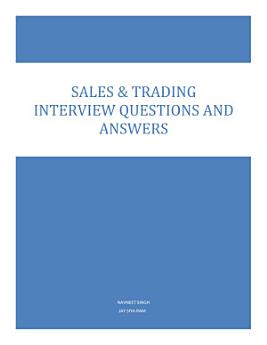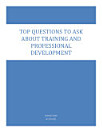Sales & Trading Interview Questions and Answers - English
About this ebook
General Questions:
1. Walk me through your resume.
Answer: Provide a concise summary of your academic background, relevant work experience, and how each step has prepared you for a career in sales & trading. Highlight skills like quantitative analysis, risk management, and decision-making.
2. Why do you want to work in sales and trading?
Answer: Focus on your passion for markets, ability to work under pressure, and desire to engage in fast-paced environments. Emphasize strengths like risk analysis, trading experience, and communication skills.
3. What is the difference between sales and trading?
Answer:
Sales focuses on building client relationships, understanding their needs, and selling financial products.
Trading involves executing trades, managing risk, and providing liquidity to markets.
Market Knowledge Questions:
4. What’s going on in the markets today? (Updated answers required)
Answer: Be prepared to discuss major indices, interest rates, recent earnings reports, geopolitical events, and monetary policies influencing the markets.
5. Explain the yield curve and its significance.
Answer:
The yield curve shows the relationship between interest rates and bond maturities.
Normal curve: Long-term rates are higher than short-term.
Inverted curve: Short-term rates are higher, often signaling a recession.
Flat curve: Indicates economic uncertainty or transition.
6. What happens when the Fed raises interest rates?
Answer:
Bond prices fall; yields rise.
Stock prices may decline due to higher borrowing costs.
The dollar strengthens as investors seek higher yields.
Behavioural and Situational Questions:
7. Describe a time when you had to make a quick decision under pressure.
Answer: Share a specific example of an urgent situation, your thought process, and how you successfully resolved it.
8. Tell me about a time you took a risk.
Answer: Highlight a calculated risk where you analysed potential outcomes and took action, emphasizing the positive results or lessons learned.
9. How do you handle failure?
Answer: Discuss a setback, what you learned from it, and how you adapted to avoid similar issues in the future.
Technical and Analytical Questions:
10. Explain delta, gamma, theta, and vega in options trading.
Answer:
Delta: Sensitivity of an option’s price to changes in the underlying asset’s price.
Gamma: Rate of change of delta, measuring convexity.
Theta: Time decay; how much value an option loses as time passes.
Vega: Sensitivity to implied volatility.
11. What is the Black-Scholes model?
Answer: A formula used to calculate the theoretical price of options based on factors like stock price, strike price, time, volatility, and risk-free rates.
12. If a stock moves 5%, how would its call option move?
Answer: Use delta to approximate the change. For example, if delta = 0.5, the option price may increase by 2.5%.
Brain Teasers:
13. How many tennis balls can fit in a Boeing 747?
Answer: Focus on estimating dimensions, volume, and packing density. Demonstrate logical thinking rather than getting an exact number.
14. If I flip a coin 100 times, what’s the probability it lands on heads exactly 50 times?
Answer: Use the binomial probability formula or mention that this follows a normal distribution approximation.
Role-Specific Questions:
15. How do you manage risk when executing trades?
Answer: Discuss stop-loss orders, position sizing, diversification, and monitoring key technical and fundamental indicators.
16. What factors influence bond prices?
Answer:
Interest rates (inverse relationship).
Credit risk of the issuer.
Inflation expectations.
Liquidity and market sentiment.
17. If a client wants to trade a large block of stock, how would you execute the order?
Answer: Mention VWAP (Volume Weighted Average Price) strategies, using dark pools for anonymity, or breaking up the order to avoid market impact.
Behavioural Wrap-Up Questions:
18. How do you stay informed about the markets?
Answer: Highlight sources like Bloomberg, Wall Street Journal, and earnings calls, as well as podcasts and social media feeds.
19. Why should we hire you?
Answer: Emphasize your quantitative skills, passion for markets, ability to work under pressure, and adaptability to volatile environments.
20. What would you do if your manager asked you to sell a product you don’t believe in?
Answer: Focus on understanding the client’s needs better, finding an alternative product, and maintaining ethical standards while addressing the issue with your manager.
Ratings and reviews
- Flag inappropriate
- Flag inappropriate
- Flag inappropriate








